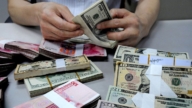【新唐人2014年05月02日讯】日前,中共广西南宁发布房市“限购”调整文件,打响了官方首次正式松绑限购令的第一枪。那么,房市限购令松绑的目地是什么?在中共为保经济增长,不断加大投入的情况下,这些措施会使走低的房价再一次被推高吗?来听听专家的分析。
据大陆官媒报导,广西壮族自治区南宁市住房保障和房产管理局,4月28号发布调整房市限购文件,从25号起,广西北部湾经济区内的5个周边城市的户籍居民,可参照南宁市户籍居民家庭政策,在南宁市内购买2套房。
报导指出,这是第一份由官方正式公布的房市“限购”调整文件。打响了正式松绑限购令的第一枪。
早前,大陆已传出温州、长沙等城市酝酿松绑限购,但都只是传言。而继杭州萧山松动了购地保证金后,29号,天津滨海新区也传出将实施差别化限购。
大陆金融分析师任中道:“因为楼市现在就是关乎地方政府的利益,各个地方的政府都在酝酿着出手救市呀、松绑呀,对那些契税进行优惠返还,各种各样的所谓的措施都在酝酿当中,那有人就已经发文说,正式的作为一个松绑的这个文件下发。”
2010年4月30号,中共颁布《国十条》推出限购令来调控房价。此次限购令松绑,不少大陆权威人士认为中央政府已经放弃房市调控政策,这也代表大陆打房政策正出现巨变。
大陆金融分析师任中道表示,由于楼市直接牵扯地方经济、银行系统、金融系统,包括民间借贷这些直接关乎中共政府的利益,中共就会想方设法采取一些变通的方式出手救市。
美国《彭博商业周刊》4月25号报导,浙江宁波奉化最大发展商“兴润置业”因债务问题面临破产。文章引述“联昌国际研究”公司(CIMB Securities Research)地产分析师(Johnson Hu)的话说,随着信贷收紧,会有更多像“兴润置业”这样的发展商倒闭。
中共总理李克强暗示,“只要没有系统性地区风险,政府就不会干预太多,因为发生一些违约情况是无可避免的。”
美国“南卡罗莱纳大学艾肯商学院”教授谢田表示,中共总理的暗示,并不是指中共政府就完全放弃了干预和完全放弃了救市,或任由市场行为来自己调节。
美国南卡罗莱纳大学艾肯商学院教授谢田:“而实质上中央政府已认识到房地产泡沫的规模已经太大太大,救也没办法全救,不救也不行。不管是广西南宁,或者是浙江奉化,只要它不是那种有全局性的、不是一线城市那种非常有政治风险很强的,它很可能就让他们破产、或让他们违约。”
天津、南宁的二三线城市出现房市限购令松绑,上海“同策房产咨询”研究部总监张宏伟向媒体表示,这是为了去库存的压力。
而谢田认为,更有可能的是,地方政府为保护自己所采取的一个举措。
任中道表示,各地政府除面临负债压力外,还不断的有新盘在入市。
任中道:“如果这个量价齐跌,资金不能回笼,房企的资金链也容易断裂,同样会给当地经济、金融系统造成冲击。”
4月中旬,中共统计局宣布了今年第一季度的国内生产总值GDP增长数据为7.4%。中共总理李克强表示,政府目前不会诉诸任何大规模刺激政策, 但政府已经准备好支撑经济增长,并确保完成全年目标。
任中道表示,4月份以来,中共动作不断,政治局开会、国务院也开会,实际上出台了各种各样的刺激措施保增长。
那么,这些措施,会使最近走低的房价再一次被推高吗?
谢田:“现在没有推高的动能。一个是房地产的泡沫、股市的泡沫﹔一个是中共政府多发的货币、多投入的货币,还有一个是海外的热钱,这三个来源都在枯竭、都在减少。”
任中道:“房价还会走低,海外融资由于人民币的贬值,困难越来越大,成本也越来越大,银行也收紧(房地产)的贷款。”
任中道表示,到5月份,超过千亿规模的信托业将到期,那时对房企的资金链会有更大的冲击。所以,采取最好的方法还是继续降价。
采访编辑/易如 后制/周天
Will House Prices Rise by Removing the House Purchase Limit?
Recently, the Chinese Communist Party (CCP) authorities
in Nanning City, Guangxi Province released a document
revising the Housing Purchase Restriction (HPR) policy.
It is the first official move to relax the house purchase limit.
What is the purpose of relaxing HPR?
The CCP is trying to maintain economic growth and
keep bolstering investment.
Will these measures halt the collapsing house prices?
According to China’s official media, on April 28
the Housing Authority and Real Estate Management Bureau
of Nanning City of Guangxi Province released a document
to free up housing market purchase restrictions.
Starting from April 25, residents of five surrounding cities
of Guangxi Beibu Gulf Economic Zone may
buy two suites in Nanning City, the same as residents of Nanning.
The report indicated that this was the first official announcement
on adjusting the housing market restrictions,
a signal of an officially move to deregulate HPR.
There were rumors earlier about removing HPR in
Wenzhou, Changsha and other cities.
After the adjustment to the land purchase deposit policy
in Songshan, Hangzhou, on April 29,
it is said that Binhai New Area in Tianjin will implement
conditional HPR.
Chinese Financial Analyst Ren Zhongdao:
“The real estate market is the interest of local governments.
They are preparing to bailout, relax on regulations,
provide return on interest and a variety of measures.
Now someone has already formally started to relax the HPR."
On April 30, 2010 the CCP issued the “Ten Rules"
introducing HRP to control house prices.
Many experts in China believe that the deregulation now
signals that the CCP authorities has abandoned HPR
and that China’s housing policy is undergoing big changes.
Ren Zhongdao indicated that real-estate is directly related to
the local economy, banking systems, financial systems and
private lending,
all of which are directly related to the interests of the CCP
government.
The CCP hence takes alternative ways to bailout the housing
market.
US Bloomberg Businessweek reported on April 25,
the largest developer “Xingyun Real-Estate" in
Fenghua, Ningbo City, Zhejiang Province
is facing bankruptcy because of debt problems.
The article quoted CIMB Securities Research
Real-estate analyst Johnson Hu
as saying that with the tightening of lending,
more developers like Xinyun will go bankrupt.
Chinese Premier Li Keqiang hinted, “The government
will not interfere much if there is no systematic risk.
Some defaults are inevitable."
USC Aiken School of Business Professor Xie Tian said that
the Chinese Prime Minister’s hint does not mean that the CCP
government has completely abandoned intervention,
or completely abandoned the bailout, or allows the market
to regulate itself.
Professor Xie Tian: “The central government has recognized
that the scale of the real-estate bubble is too much.
There is no way to save it, but it won’t do not to save it.
Whether Nanning in Guangxi or Fenghua in Zhejiang,
as long as they do not impact the overall system,
and they are not the first-tier cities with strong political risk,
it is feasible to let them go bankrupt or default."
After the second and third tier cities of Tianjin and Nanning
relaxed on HPR,
Shanghai “Tongce Real-estate Consulting"
Research leader Zhang Hongwei told the media
it was to release the pressure on inventory.
Xie Tian thinks it is more likely that
local governments are using these measures to save themselves.
Ren Zhongdao incidated that local governments face the issue
of new inventories entering the market as well as default.
Ren Zhongdao: “If both volume and price drop,
money cannot be repaid.
It is likely that real-estate enterprises’ capital chain will break
and hit local economies and financial systems."
In mid-April, CCP Bureau of Statistics announced
that Q1 GDP growth was 7.4 %.
Chinese Premier Li Keqiang said that the government
is not resorting to any large-scale stimulus,
but the government is ready to support economic growth
and to ensure the completion of the annual target.
Ren Zhongdao said that the CCP has been active since April,
such as the Politburo meeting and the State Council meeting.
It introduced a variety of stimulus measures to ensure growth.
So, will these measures push the falling house prices back up?
Xie Tian: “It does not have the power to push up the price.
One reason is the real-estate bubble and the stock market bubble;
another reason is the extra money issued by the CCP government,
the third reason is hot money from overseas.
All these sources are declining."
Ren Zhongdao: “The house prices will continue to fall.
Overseas finance is more difficult due to the Yuan’s
devaluation.
The cost is also growing,and banks are tightening up on
(real-estate ) lending."
Ren Zhongdao said that more than one hundred billion yuan
of trust will come due in May.
It will have a large impact to the real-estate capital chain.
So the best way is to continue to cut prices.
Interview & Edit/Yi Ru Post-Production/Zhou Tian



























